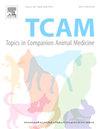All pet owners are not the same: End-of-Life caregiver expectations and profiles.
IF 1.3
3区 农林科学
Q2 VETERINARY SCIENCES
引用次数: 0
Abstract
The study aims to explore the specific needs of French pet owners who have experienced the loss of a pet, recognizing the limited focus on end-of-life and palliative care in veterinary practice. By characterizing owner profiles, the research seeks to enhance veterinary approaches and education to better address the unique challenges and emotional aspects associated with pet care and loss. An anonymous online survey was distributed to 302 French owners who already experienced the loss of an animal, including demographic information and feelings about their experience of a pet's end-of-life (EOL). Data were analysed using descriptive and qualitative analysis (including the use of AI chatbot ChatGPT). 56.6 % of participants reported a relatively smooth pet death, yet 67.0 % found the end-of-life period challenging. Three distinct owner groups emerged, each with varying needs. The first group expressed high guilt and a greater need for support, emphasizing the necessity for information and improved training. The second group, more informed and independent, benefits from veterinary support, while a leaflet suits them. The third group, competent in pain evaluation, requires less veterinary support. These differences highlight the importance of personalized owner support. The study proposes essential pillars for veterinarians and nurses' training, forming the EPITO system: Emotional support, Personalization, Information, Training, Tools, and Open discussion.
所有的宠物主人都不一样:临终关怀者的期望和简介。
该研究旨在探索法国宠物主人的特殊需求,他们经历了宠物的损失,认识到兽医实践中对临终关怀和姑息治疗的关注有限。通过描述宠物主人的特征,该研究旨在加强兽医方法和教育,以更好地解决与宠物护理和失去相关的独特挑战和情感方面的问题。一项匿名在线调查向302名已经失去宠物的法国主人分发,包括人口统计信息和他们对宠物生命终结(EOL)经历的感受。数据分析使用描述性和定性分析(包括使用人工智能聊天机器人ChatGPT)。56.6%的参与者报告了相对平稳的宠物死亡,但67.0%的人认为生命的最后阶段具有挑战性。出现了三个不同的业主群体,每个群体都有不同的需求。第一组人表达了强烈的负罪感和对支持的更大需求,强调信息和改进培训的必要性。第二组人更了解情况,也更独立,他们受益于兽医的支持,而传单则适合他们。第三组,在疼痛评估能力,需要较少的兽医支持。这些差异突出了个性化所有者支持的重要性。该研究提出了兽医和护士培训的基本支柱,形成EPITO系统:情感支持、个性化、信息、培训、工具和公开讨论。
本文章由计算机程序翻译,如有差异,请以英文原文为准。
求助全文
约1分钟内获得全文
求助全文
来源期刊

Topics in companion animal medicine
农林科学-兽医学
CiteScore
2.30
自引率
0.00%
发文量
60
审稿时长
88 days
期刊介绍:
Published quarterly, Topics in Companion Animal Medicine is a peer-reviewed veterinary scientific journal dedicated to providing practitioners with the most recent advances in companion animal medicine. The journal publishes high quality original clinical research focusing on important topics in companion animal medicine.
 求助内容:
求助内容: 应助结果提醒方式:
应助结果提醒方式:


